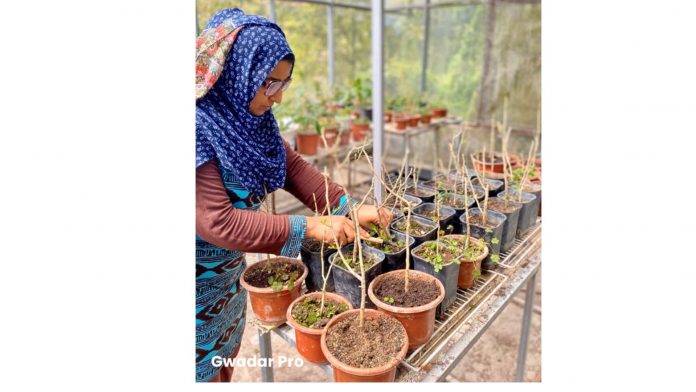DNA
BEIJING, SEPT 9 – Insect-pest has long been a headache for Pakistani farmers, and the aim to ease the burden of farmers and improve yield sparked of interest in learning agri-entomology and pest control in China.
This was stated by Hafiza Javaria Ashraf, a female Ph.D student at Fujian Agriculture and Forestry University (FAFU) in China, according to a report published by Gwadar Pro on Wednesday.
She was confident that she could play a role in integrated pest management (IPM) that emphasizes the growth of a healthy crop with the least possible disruption to agro-ecosystems and encourages natural pest control.
Hafiza graduated from the University of Agriculture Faisalabad (UAF) in 2015 with a bachelor’s degree in agricultural entomology. She came to China for further study and received Master’s Degree at FAFU in 2018.
As the top 10 excellent students, Hafiza won the scholarship offered by the Chinese scholarship council (CSC) and FAFU and continued her Ph. D study in plant protection.
The scholarship was established for excellent scientists in the agricultural field based on an agreement signed between FAFU and UAF in 2017.
“Being a girl, I’m the first one among the whole family to come overseas for studies. My parents supported me upon this decision and encouraged me to acquire a doctorate from China,” Hafiza said.
“The facilities provided by State Key Laboratory of Ecological Pest Control for Fujian and Taiwan Crops, College of Plant Protection, FAFU, and my respectable adviser – Prof. Liande Wang is the major reasons I was able to pursue my research dreams here.”
The report added, as per the official statistics, Pakistan’s agriculture sector contributes 18.5 percent to the total GDP. Despite its continuously growing agricultural production, Pakistan is still facing a high level of food insecurity.
Every year the damage done to crops by pests and diseases, according to data of FAO, constitutes approximately 20–25 percent of the potential world yield of food crops.
Therefore, plant protection plays an extremely important role in increasing the production of crops and protecting them.
In March this year, Pakistan and China signed a Memorandum of Understanding to jointly establish a center to fight against the locust threat in Pakistan.
The two countries will carry out comprehensive cooperation on plant protection, including monitoring and early warning, demonstration, mutual recognition of standards, personnel training, and emergency response.
“As I have a keen interest in and a grip on basic knowledge in plant protection, I deliberately chose the research subject of pests control, under which I study the insects that impair the growth of orange orchards,” Hafiza told the reporter.
She has been carrying out an experiment on D. citri for more than a year and got significant findings in the research.
Dr. citri originated in Asia but is now also found in parts of the Middle East, South and Central America, Mexico, and the Caribbean. It has also been reported more recently in Tanzania in East Africa, indicating its global spread.
Its presence poses significant risks of further spread across the other continent due to the increase in international and transcontinental trade.
The study by Hafiza is therefore to provide a massive biological control of D. citri that would optimize economic losses in orange orchards all over the globe.
She explains that the current study is to investigate the biology and molecular taxonomy of T. radiata from different countries and to assess the diversity of the cultivable gut bacterial communities associated with this parasitoid, envisaging its mass production.
Once completed, it will contribute to the establishment of a biological control program for D. citri, as a component of integrated pest control (IPC) in different citrus-growing regions of China.
To keep the continuity and consistency of the experiment, Hafiza chose to stay at school during the winter vacation. “The COVID-19 epidemic did not much affect my research data sampling.
The school provides a suitable, friendly, and scientific environment for international students and the friendly nature of Chinese lab fellows towards Pakistanis living in China is virtuous. They treat us with a lot of respect.”
Talking about the future plan, Hafiza said, “being a patriotic person, I prefer to go back to serve my country and contribute my knowledge and skills to my motherland as it is flourishing and the agriculture sector needs experts like me to realize higher production.”

















